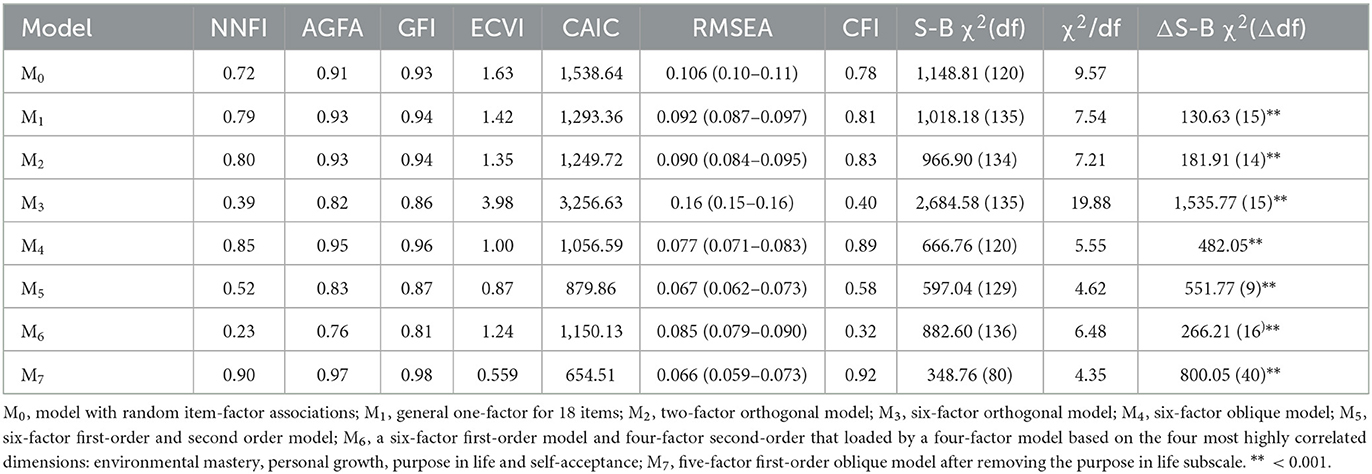
94% of researchers rate our articles as excellent or good
Learn more about the work of our research integrity team to safeguard the quality of each article we publish.
Find out more
CORRECTION article
Front. Psychol., 03 November 2023
Sec. Positive Psychology
Volume 14 - 2023 | https://doi.org/10.3389/fpsyg.2023.1324006
This article is a correction to:
The 18-item Swedish version of Ryff’s psychological wellbeing scale: psychometric properties based on classical test theory and item response theory
A corrigendum on
The 18-item Swedish version of Ryff's psychological wellbeing scale: psychometric properties based on classical test theory and item response theory
by Garcia, D., Kazemitabar, M., and Asgarabad, M. H. (2023). Front. Psychol. 14:1208300. doi: 10.3389/fpsyg.2023.1208300
In the published article, there was an error in Table 4 as published. The incorrect version of Table 4 was published. The corrected Table 4 and its caption appear below.

Table 4. Goodness-of-fit indices for confirmatory factor analysis of the 18-item Swedish version of Ryff's psychological wellbeing scales.
The authors apologize for this error and state that this does not change the scientific conclusions of the article in any way. The original article has been updated.
All claims expressed in this article are solely those of the authors and do not necessarily represent those of their affiliated organizations, or those of the publisher, the editors and the reviewers. Any product that may be evaluated in this article, or claim that may be made by its manufacturer, is not guaranteed or endorsed by the publisher.
Keywords: classical test theory, item response theory, psychological wellbeing, psychometrics, wellbeing, health
Citation: Garcia D, Kazemitabar M and Habibi Asgarabad M (2023) Corrigendum: The 18-item Swedish version of Ryff's psychological wellbeing scale: psychometric properties based on classical test theory and item response theory. Front. Psychol. 14:1324006. doi: 10.3389/fpsyg.2023.1324006
Received: 20 October 2023; Accepted: 24 October 2023;
Published: 03 November 2023.
Edited and reviewed by: Murat Yildirim, Aǧri İbrahim Çeçen University, Türkiye
Copyright © 2023 Garcia, Kazemitabar and Habibi Asgarabad. This is an open-access article distributed under the terms of the Creative Commons Attribution License (CC BY). The use, distribution or reproduction in other forums is permitted, provided the original author(s) and the copyright owner(s) are credited and that the original publication in this journal is cited, in accordance with accepted academic practice. No use, distribution or reproduction is permitted which does not comply with these terms.
*Correspondence: Danilo Garcia, ZGFuaWxvLmdhcmNpYUBpY2xvdWQuY29t; Mojtaba Habibi Asgarabad, bW9qdGFiYS5oLmFzZ2FyYWJhZEBudG51Lm5v
†These authors have contributed equally to this work and share first authorship
Disclaimer: All claims expressed in this article are solely those of the authors and do not necessarily represent those of their affiliated organizations, or those of the publisher, the editors and the reviewers. Any product that may be evaluated in this article or claim that may be made by its manufacturer is not guaranteed or endorsed by the publisher.
Research integrity at Frontiers

Learn more about the work of our research integrity team to safeguard the quality of each article we publish.